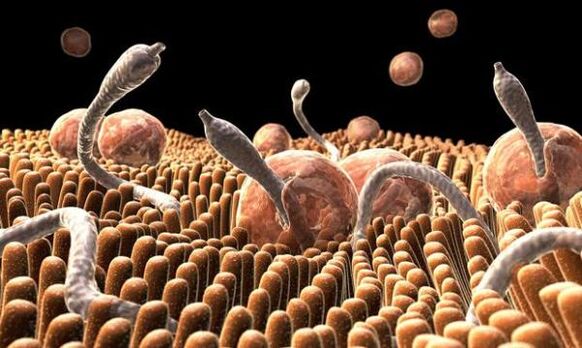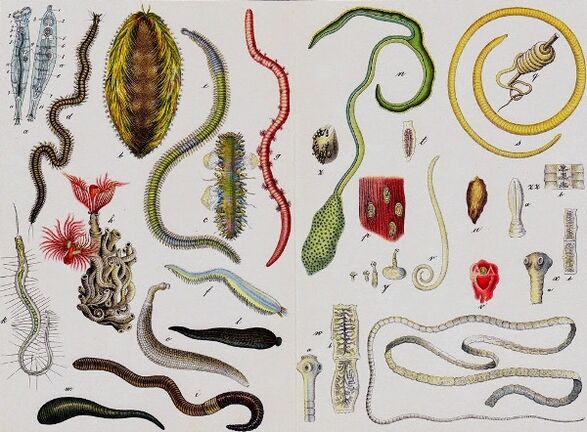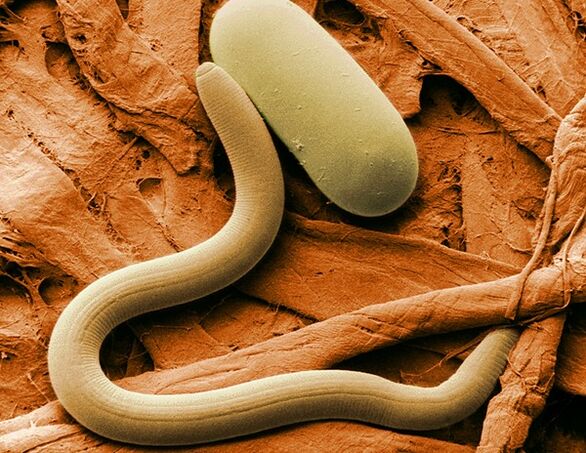
How dangerous are parasites?
- Vomit;
- weakness;
- Loss of appetite;
- high body temperature;
- fever;
- twitch.
- Cerebral amoeba (tapeworm). It lives as a parasite in the brain and can live up to 20 years. As the tapeworm grows, it often kills its owner. Death occurs in 97% of cases. The worm can cause swelling of the brain, and infection may result from consuming contaminated meat or water.
- roundworms. Ring worms, commonly found in children. Adults can reach 30 cm in length. General symptoms of poisoning occur, and you can become infected through dirty hands.
- Onchocerciasis. A worm that causes river blindness (onchocerciasis).
- Trypanosoma. Causes chronic heart and intestinal disease.
- australian tick. Causes severe allergic reactions, leading to respiratory failure.
General symptoms
- feel sick and vomit;
- stomach ache;
- Intestinal dysfunction (diarrhea or constipation);
- Itching of the anus;
- Teeth grinding during sleep;
- Loss of appetite;
- Headache;
- weakness, fatigue;
- Vitamin deficiency;
- decrease in immunity;
- anemia;
- cough;
- joint or muscle pain;
- Drastic weight loss or gain.
Types of parasites

- ectoparasites;
- worm;
- Protozoa (protozoa).
ectoparasites
- Head, pubic and body lice - pediculosis;
- Bedbugs - are carriers of infectious diseases such as hepatitis, tuberculosis, and typhoid fever;
- Demodicosis - Demodicosis;
- Scabies mites - scabies;
- cochlioma—cochliomyasis.
- In the intestine - amoeba, lamblia, leishmania, blastocystis, balanditia;
- In the blood - Trypanosomatids, Babesia;
- In the genitourinary system - Trichomonas;
- Visceral (heart, lungs, liver, brain) - Toxoplasma gondii, trypanosomatids, Acanthamoeba.
worm
- Ascariasis. The larvae pass through the digestive tract and settle in the intestines. Adults can reach 25-30 cm.
- Metatesticular disease. Adult worms infect bile ducts and enter the body along with infected fish.
- Taeniasis. Infections caused by tapeworms occur in humans through meat and fish, affecting the intestines.
- Schistosomiasis. Caused by flukes or flatworms. Infection occurs when water contaminated by freshwater snails comes into contact with the skin.
- Nematodes – roundworms;
- Flukes - Flukes;
- Tapeworms are tapeworms.
Nematodes

- pinworm;
- roundworms;
- Whipworm.
- feel sick and vomit;
- Itching of the anus;
- rash;
- indigestion;
- Chronic fatigue.
fluke
- Schistosoma - blood fluke;
- Liver Fluke – Liver Fluke;
- intestinal flukes;
- Pancreatic parasites;
- Paragonimiasis.
Tapeworm
- tapeworm;
- cattle and pork tapeworms;
- sheep brain;
- Echinococcus tapeworm.
Which doctor should I contact if I suspect parasites?
diagnosis
treat
Parasite drug treatment
Traditional treatments for parasites
- cranberry juice enema. It helps remove worms and protozoa. 2 tbsp for 2 liters of water. lake cranberry juice and 1 tbsp. Lake salt. Perform this procedure 2 times a day.
- garlic enema. You can get rid of intestinal parasites by boiling 6 cloves of garlic in 1 liter of milk, cooling and giving an enema.
- pumpkin seeds. Peeled seeds (300 grams) must be mashed, add a small amount of water, and add 100 grams of honey. Take once with a laxative.
- Onion dip. Cut the green onion into cubes, pour boiling water over it and leave it for 12 hours. Drink 100 grams 3-4 times daily.
complication
- Frequent acute respiratory viral infections, adenoid and tonsil enlargement;
- appendicitis;
- Enteritis, gastroenteritis, enterocolitis;
- Cirrhosis;
- liver cancer;
- anemia;
- gastrointestinal bleeding;
- pancreatitis;
- bronchitis;
- neoplastic diseases;
- Brain edema;
- Purulent septic lesions.
prevention
- Wash your hands before eating and after going out;
- Consume only washed vegetables and fruits and boiled water;
- Store food in compliance with hygienic standards and avoid contact with flies;
- Meat and fish can only be eaten after heat treatment;
- Don’t swim in polluted waters;
- Not using other people’s personal hygiene products;
- Deworm pets.




























